22-Year-Old Graduates From College After Surviving Brain Tumor, Two Major Surgeries: 'I'm Finally Moving On' (Exclusive)
Cameron Monesmith opens up to PEOPLE about undergoing two brain surgeries leading up to his college graduation
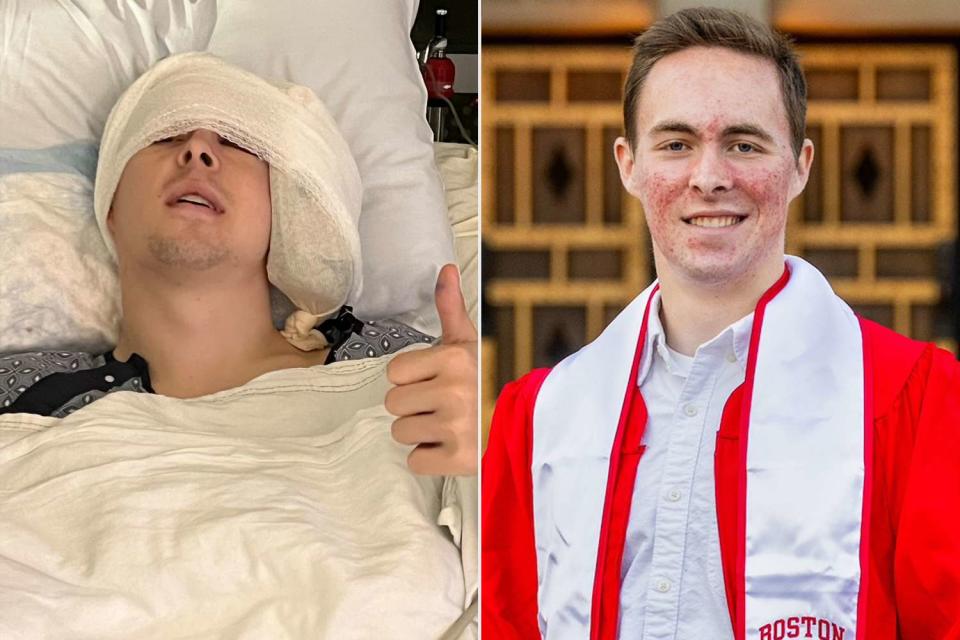
Cameron Monesmith
Cameron MonesmithCameron Monesmith was diagnosed with a brain tumor in December 2022
The 22-year-old underwent surgery and treatment while in school at Boston University
He is now celebrating his college graduation and good health
Cameron Monesmith was enjoying his summer before heading back to Boston University for his junior year. Halfway through the summer he noticed he couldn’t feel the bottom of his right foot. Although it was “a little scary,” he chalked it up to stress and frequent travel.
As his vacation continued, the numbness spread to his entire foot and he decided to see a doctor. Everything checked out as normal, but he was advised to visit a neurologist when he went back to Boston for school.
But with a packed class schedule, car troubles and exams, Monesmith — from Cleveland, Ohio — wasn’t able to see a neurologist until December 11, 2022. By that point, the numbness in his foot had spread to the entire right side of his body. He needed an MRI.
Despite his symptoms, the only thing Monesmith was concerned about was studying for his final exam in finance.
“In my world, I had my finals and that's what mattered. My grades mattered more than anything,” the 22-year-old tells PEOPLE. “And I'd always been pretty healthy so I kind of just trusted that everything will be fine. But the neurologist seemed a little scared and told me that it was likely a big issue.”
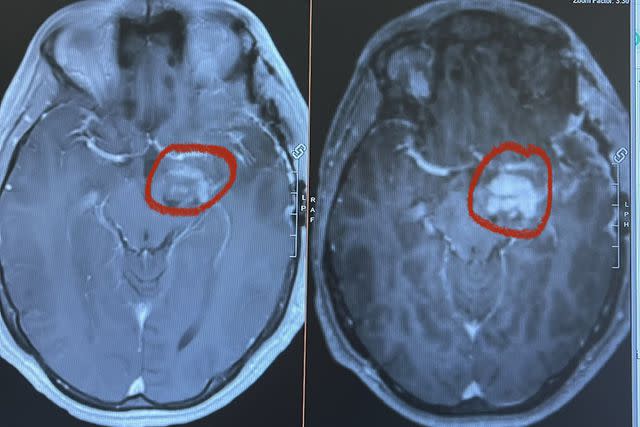
Cameron Monesmith
Cameron Monesmith's brain tumorShortly after the MRI at Lahey Hospital in Burlington, Mass., Monesmith was immediately taken to the emergency room. The college student started to understand the severity of the situation. He was diagnosed with pilocytic astrocytoma (PA), a slow-growing brain tumor that arises from astrocytes, the supportive cells in the nervous system.
“The doctor tells me, ‘There's an egg-sized brain tumor in your brainstem that I do not have the power to remove,’” Monesmith recalls.
“I definitely did not feel like I was in the real world,” he says of the diagnosis. “I’m going from the person that was entirely focused on academics and staying fit to this whole new world of, everything's at risk. Life is at risk. It definitely took me aback.”
Monesmith and his parents quickly sought second opinions and were told the brain tumor was operable. He felt a little more optimistic and scheduled a craniotomy just two weeks later under Dr. Bob Carter at Mass General Hospital.
Never miss a story — sign up for PEOPLE's free daily newsletter to stay up-to-date on the best of what PEOPLE has to offer, from celebrity news to compelling human interest stories.
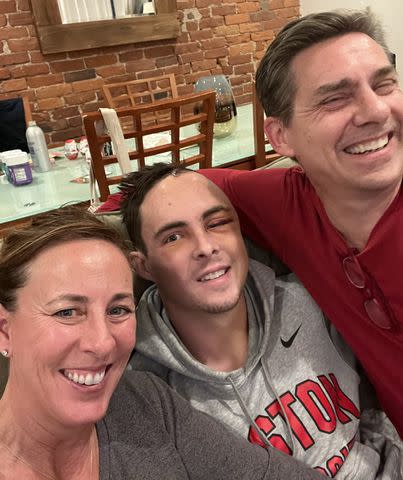
Cameron Monesmith
Cameron Monesmith with his parentsSurgery was successful, but Monesmith had a difficult recovery. He lost his peripheral vision on the right side and had to relearn to walk and talk.
Although many college students in the same situation would’ve taken a leave of absence and finished classes after recovering, Monesmith decided to continue school, determined to get his degree on time.
“We had all this uncertainty with the brain tumor and the recovery was a very long and slow process,” he explains. “But to me, I controlled the few things I could control. I was getting something good out of it.”
He explains, “I wanted to prove to myself that I could still do these things, that despite the brain surgery, despite the vision loss and me barely being able to speak, I could get something done,” he said. “I felt that I had to keep going because it was the one thing pushing me forward. And it was the one thing that was getting me excited to continue, and it made me feel whole.”
As Monesmith continued his recovery and his classes, he had a positive outlook. It was the spring semester and he felt nearly 80% back to normal.
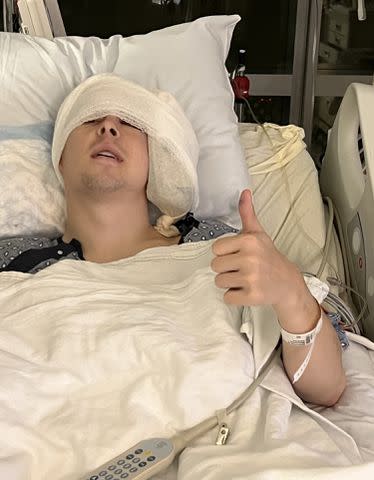
Cameron Monesmith
Cameron Monesmith in the hospital after brain surgeryBut in April 2023, Monesmith says he felt himself start to “deteriorate pretty quickly.” Another MRI ultimately revealed that his brain tumor had grown back.
“I knew it. Far before I needed the MRI I could see it happening, the deterioration. And it got to me for sure,” he says, admitting that it took a toll o his mental health. “It made me very frustrated being someone who does try to stay healthy. My body's rebelling against me.”
He continues, “I go into the appointment on the second to last day of classes, and they tell me, ‘Cam, we're going to have to do another surgery this coming summer. We can do it in August, but it's getting dangerous, so we'd like to do it sooner.’ And I look up and I just smile. I go, ‘Here we go again.’”
With final exams approaching, Monesmith underwent his second craniotomy on May 2, 2023, calling it a “bad sequel.” But he remained optimistic, using what he learned from his first surgery to make a smoother recovery.
Related: Olympian Maia Shibutani 'Doing Well' After Past Kidney Tumor, Reveals 2024 Olympic Plans (Exclusive)

Cameron Monesmith
Cameron Monesmith after recovering from his brain surgeriesThe second time around, Monesmith worked more closely with Dr. Jorg Dietrich, a neuro-oncologist at Mass General Hospital.
Dietrich says the standard treatment for a brain tumor would be radiation and chemotherapy. But with Monesmith’s specific diagnosis, he had concerns about radiation causing cognitive deficits, vision loss and harm to the endocrine system. Instead, Dietrich says they used “targeted therapy," starting Monesmith on an experimental drug that would shrink his tumor.
“We saw within just two to three months quite a striking success of tumor shrinkage,” he tells PEOPLE, sharing that Monesmith has taken the medication daily for about a year. “I think it's been working exceptionally well. It has really removed all of the concerning features of this tumor, which were interfering with some of his motor function.”
“Cam is an inspirational, very mature young man," Dietrich says. "His ability to push through and overcome challenges that have come his way unplanned — just the unknown of whether the tumor would interfere with his ability to pursue his dreams and his academic development — I think he has really been steadfast and his optimism has certainly paid off.”
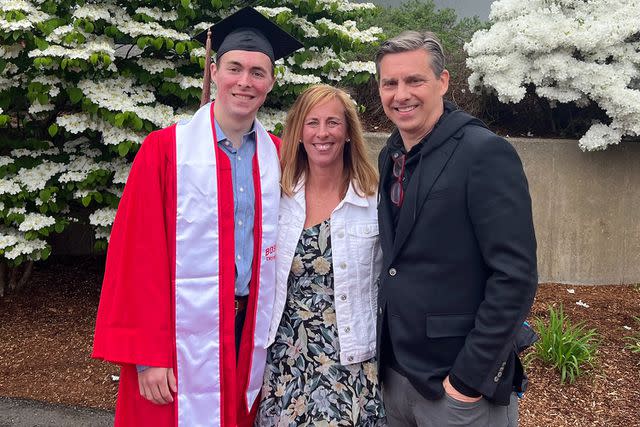
Cameron Monesmith
Cameron Monesmith after graduation at Boston UniversityRelated: His Wife Divorced Him Over a 'Personality Change': 'Turns Out I Have a Brain Tumor'
Monesmith admits that the new medication comes with its share of “frustrating” side effects, but he reminds himself not to be “greedy” because he “never expected to get this lucky.”
Since then he has felt much more like himself as his health continues to improve.
“It was very freeing,” he says, of feeling like himself again. “It felt like I was taking just a massive weight off of my shoulders and finally able to live life normally.”
Now, a year after his second brain surgery, Monesmith accomplished his goal and graduated May 19 with a business degree. He has a full-time job lined up at Fidelity Investments.
“I've come to a new version of me," he tells PEOPLE. "It feels like I'm closing this chapter of constant focus on this medical emergency. I feel like I'm finally moving on from it."
For more People news, make sure to sign up for our newsletter!
Read the original article on People.

